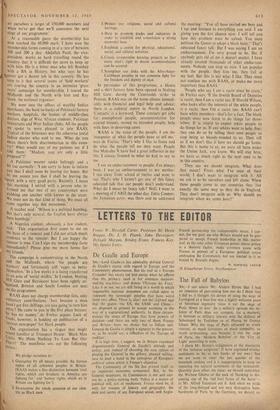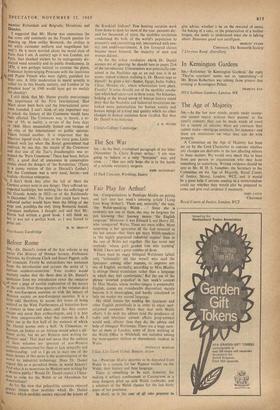The Fall of Babylon
SIR,---I can assure Mr. Alistair Home that I had no intention of patronising him nor do I think that I did so. I thought his device of using the siege of Leningrad as a base-line was a highly welcome piece of historical ingenuity since it cut the siege of Paris 'down to size.' As a military episode the de- fence of Paris does not compete, for a moment, in heroism or military interest with the defence of Sebastopol by Todleben or of Plcvna by Osman Ghazi. Why the siege of Paris attracted so much interest, so much literature. so much sympathy, so much sermonising, was because it was the siege of Paris, the 'Modern Babylon' or the 'City of Light' according to taste. I share Mr. Horne's indignation at the massacres of the `semaine sanglantc' (I have expressed similar sentiments to his in two books of my own.) But we are soon to enter the last quarter of the twentieth century and it is inappropriate to keep on repeating the natural sentiments of the nineteenth. Quantity does affect the issue; we should remember the Warsaw Ghetto or the sack of Nanking in dis- cussing one of the 'red fool furies of the Seine'— as Mr. Alfred Tennyson put it. And when we think of the long-delayed and not very destructive bom- bardment of Paris by the Germans, we should re-
member Rotterdam and Belgrade; Hiroshima and Dresden.
I suggested that Mr. Horne was censorious (he has some odd comments on the French passion for dressing up. How unlike Bismarck, the civilian in his white cuirassier uniform and magnificent hel- met!). He is more worried about the moral state of Paris than I am. A century ago it was London, not Paris, that shocked visitors by its outrageously dis- played venal sexuality and its public drunkenness. In 1870, it was perhaps natural to contrast the pious, Protestant hymn-singing Prussians with the lascivious and Papist French who were rightly punished for their sins. A little moderation in moral severity is called for in this bloody century, and London in 'its Proudest hour' in 1940 would have got no medals for chastity!
I still think that Mr. Horne greatly over-stresses the importance of the First International. Had Marx never been born and the International never been founded, I can't think of any important way in which the history of the Commune would have been affected. The Commune was, in theory, a re- run of '93; in reality, a re-run of the June days of 1848. Marx successfully foisted one version of the role of the International on public opinion; ['fliers foisted another. It is important that the Marxian legend stuck, that, so the story goes, Lenin danced with joy when the Soviet government had outlived, by one day, the record of the Commune and that one of the Tsar's dreadnoughts was re- named the 'Paris Commune.' There had been, before 1871, a good deal of uneasiness in conservative circles about the dangers of 'the Revolution.' (There is a comic version of this in Disraeli's Lothair.) But the Commune was a very local, heroic—and foolish—Parisian enterprise.
I don't think that after the fall of Metz the German armies were in any danger. They suffered un- expected hardships, but nothing like the sufferings of the Grande Armee in 1812—or of the Reichswehr in December 1941. The most that could have been achieved earlier would have been the lifting of the siege and, possibly, the only thing Bismarck feared, European mediation. I thought and said that Mr. Horne had written a good book. I still think so, but it was not a perfect book, as I was forced to Point out.
Pete rhouse, Cambridge















































 Previous page
Previous page